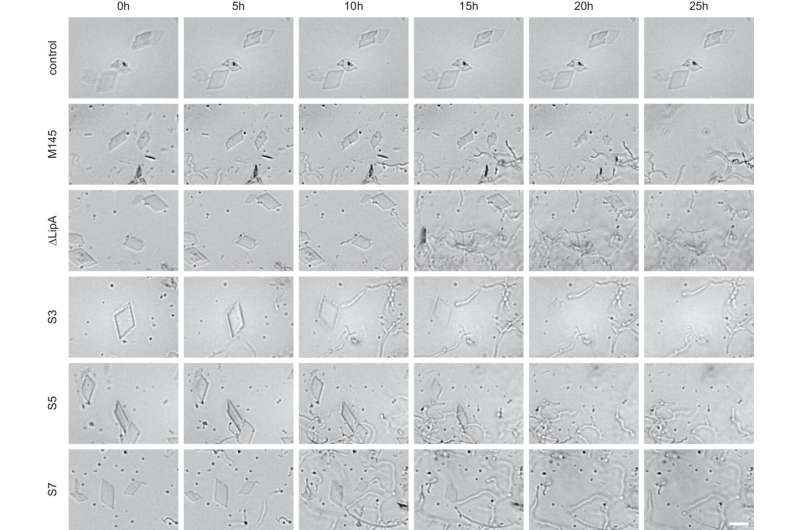This article has been reviewed according to Science X's editorial process and policies. Editors have highlighted the following attributes while ensuring the content's credibility:
fact-checked
peer-reviewed publication
trusted source
proofread
Researcher discovers 1 in 5 bacteria can break down plastic

Leiden Ph.D. candidate Jo-Anne Verschoor discovered that nearly 20% of the bacterial strains she studied could degrade plastic, though they needed some encouragement to do so. "Bacteria are just like people," says Verschoor. Her research was published in the journal Communications Biology.
Some of the world's smallest organisms could play a significant role in solving the problem of plastic pollution. Increasingly, it is being discovered how certain bacteria can break down plastic into small particles, which can then be recycled.
Moreover, Verschoor's research reveals that many more bacteria than previously thought can degrade certain types of plastics. The 27-year-old Leiden microbiologist was able to use a large collection of Streptomyces bacteria, which were already available at the university as scientists use them in the search for new antibiotics.
Searching for the right conditions
The bacteria Verschoor worked with were not collected with the goal of plastic degradation in mind. "In other research, scientists sometimes look at which bacteria would thrive in a landfill," says Verschoor. This collection was impartial in that sense. Moreover, it consisted of a mix of multiple continents.
Through her previous research, Verschoor suspected that some of these bacteria could indeed digest plastic, and she was right. In lab experiments, she exposed the bacteria to different substances and conditions, observing the effects on how the organisms could break down PET plastic.
Plastic bottle doesn't just disappear in the soil
The external conditions are crucial because a plastic bottle doesn't just disappear when it lies in the soil for a while. "Bacteria are like people in that sense," says Verschoor. "Just like us, they don't do things automatically; they need encouragement. We only start running when we are chased by a tiger."
Similarly, bacteria surrounded by a lot of sugar, and thus energy, won't do something that requires too much effort. However, if they are "hungry," they will. This was evident during lab experiments where Verschoor added plastic models to plates with bacteria. At one point, she even "fed" the bacteria perforated pieces of plastic.
First large-scale experiments
The biologist, who will complete her Ph.D. next year, made two discoveries. First, she noticed that a remarkable number of bacteria could degrade plastics under the right conditions: as much as 18% of the strains studied. She also discovered that a gene called "Lipase A" plays a significant role. When it was present in large numbers, the organisms broke down plastic more quickly.
This research expands the pool of bacteria that we can potentially use to degrade plastic. The future of this method of plastic recycling is promising, as demonstrated by the French company Carbios, which is the first to experiment with large-scale recycling of plastics with the help of bacteria and their enzymes.
More information: Jo-Anne Verschoor et al, Polyester degradation by soil bacteria: identification of conserved BHETase enzymes in Streptomyces, Communications Biology (2024). DOI: 10.1038/s42003-024-06414-z
Journal information: Communications Biology
Provided by Leiden University





















